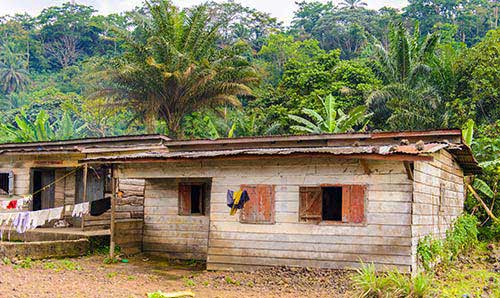Food security in Africa: Crop choice, gender and children
A series of research projects has explored African farmers’ allocation of land and labour. across food and tropical cash crops. In particular, the impact of these choices on food security and prosperity is considered, placing a special emphasis upon gender and children
The challenge

The dramatic increase in food prices in 2008, followed by subsequent spikes in later years, has raised international awareness around the link between food price fluctuations, food security and resource scarcity.
The Food and Agriculture Organization of the United Nations (FAO) estimated that the food price spike of 2008 alone plunged over 24 million additional Sub-Saharan Africans into hunger, increasing the number of undernourished to a record 236 million. Media coverage focused on both the potential rise in land scarcity, in response to excess demand for food, and scarcity-driven conflict.
There is no unambiguous answer to the question of whether tropical cash crop production or food production is more beneficial for household welfare, and where the efforts of pro-poor governments should be placed. Aside from general resource constraints, much of the continent is plagued by institutional constraints – particularly gender-based – that shape the choice between food and cash crop production.
In the majority of these contexts, food crops are considered ‘female crops’. Due to land and resource ownership constraints, women find it difficult to enter the cash crop sector or be productive in the food sector. This situation is also marked by a high incidence of child labour.
Ongoing research and current evidence

With support from the British Academy, Ralitza Dimova and Monnet Gbakou used rich survey data from the peak of the 2008 food crisis to explore the welfare implications of rising food prices. Ivory Coast is one of the largest international exporters of cash crops such as cocoa, and one of the largest importers of food crops like rice.
The prediction was that household welfare would increase dramatically on account of doubling prices of internationally traded food commodities. Contrary to expectations, the authors not only found that rising food prices are beneficial for the poor, but crucially that cash crop production helped them alleviate the negative implications of a food price shock. The research attracted interest from the World Bank, and was featured in a blog title 'Rice Market Risk: Insights from Côte d’Ivoire'
Dimova, alongside Katharina Michaelowa, Subhashis Gangopadhyay and Anke Weber, explored choices made by farmers between food, cash crops and non-farm labour, and the effect of these choices on welfare in the event of a negative production shock.
The authors found that whilst the cash crop market is more remunerative, poor farmers face serious land and other resource based constraints in entering this market. Moreover, significantly riskier cash crop production exposes producers to a disproportionate loss in the event of a price or weather shock. The development of viable non-farm labour market opportunities is offered as a policy response to resource constrained subsistence farmers and unpredictable shock ridden cash crop farmers:
Gender issues with respect to the choice between food, cash crops and productivity in Malawi was explored by Dimova, Ira N. Gang and Sumon Bhaumik in research sponsored by the United Nations Foundation. The research found that cash crops are generally more beneficial for household prosperity and relocation of land from men to women reduces the probability of households entering the more remunerative cash crop market (and also productivity in that market upon entry).
The policy implication is that in the absence of complementary resources, such as capital and networks, transfer of land ownership rights to women may actually be counter-productive.
Details on the full article can be found here:
Response of stakeholders and pathways to impact
Taken together, the research has been complemented by ongoing dialogue with key stakeholders in Ivory Coast. Key informants include: Dr Koffi Pokou (Ministry of Planning), the village chief of Loboyo village near Soubré; Véronique Ndri, Tano Kolo and Bamasso Zalé from the Association of Female Agricultural Producers; and Kouadio Tiacoh Thomas, from the Rice Union of Ivory Coast. In order to consolidate an approach to impact, a ten minute film has been produced to showcase these viewpoints.
These testimonies echo the authors’ prior findings, providing further context-specific insight. Perhaps most importantly, these contributions open up new research horizons in the context of competition around space for cash crops, and the ever present threats associated with climate change.
The film can be viewed below:
Key people
- Ralitza Dimova
- Monnet Benoit Patrick Gbakou
- Ira Gang
- Arnab Basu
Current project
December 2015 to December 2016
British Academy/Leverhulme: “Household preferences and child labour. Field experiment from Ivory Coast (with Monnet Gbakou, University of Cocody-Abidjan and Arnab Basu from Cornell University)
According to the latest estimates of the International Labor Organization (ILO), about 168 million children between ages five and seventeen work (ILO 2015). The area of greatest concern is Sub-Saharan Africa, where one in five children is employed, compared to nine percent of children in Asia and Latin America and eight percent in the Middle East and North Africa. The majority of these child labourers are engaged in agricultural activities; contexts like Ivory Coast are emblematic of some of its worst cases, especially in the cocoa producing sector.
Evidence suggests that child labour has detrimental implications on outcomes later in life. In particular, the development of human capital and the perpetuation of poverty traps. While previous research based on household surveys has identified poverty and credit constraints as primary determinants of child labour, leading to policy prescriptions targeting households accordingly, no single approach has managed to provide a tangible solution to the problem. An important shortcoming of earlier research is a failure to take into account behavioural preferences of adults (in terms of risk taking, time preferences and reciprocity/altruism) .
This may have important implications for both decision making in general, and child labour in particular. Moreover, addressing the outcomes of behaviour without addressing peculiarities in the behaviour itself, has important implications regarding the relative success of policies.
This project will conduct three field experiments, in order to better understand behavioural preferences. Households will be selected in six Ivory Coast villages, randomised across different types of crop production, making it possible to draw conclusions with respect to the relationship between crop choice and child labour. These experiments will be supplemented with relevant household and individual level data in order to further study the effect of behavioural preferences on the existence and intensity of child labour in each village. These findings will allow us to both challenge stylised policy prescriptions.
